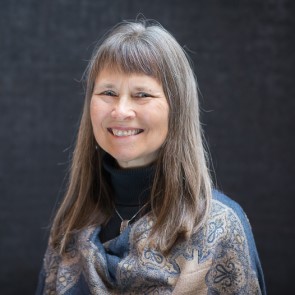
“The Forensic Turn in Holocaust Studies: Proper Burial in the Aftermath of Violence”
Professional Background
Karen Remmler, Mary Lyon Professor of Humanities at Mount Holyoke College, received her PhD in German literature from Washington University in 1989. Most recently, her interdisciplinary research in cultural studies has focused on the politics and cultures of transnational memory, forensic approaches to the remains of the dead in the aftermath of mass and systemic violence, as well as visual representations of proper burial and the dead in the digital age. She also writes and teaches on the remembrance of the Holocaust in film, contemporary German Jewish culture, and cultural forms of global transitional justice.
Remmler’s publications include volumes and essays on contemporary Jewish culture and writing in Germany, the production of memory in the work of the late German writer W.G. Sebald, and transgenerational memory of the Holocaust and the Rwandan genocide through digital technologies. Remmler is the author of Waking the Dead: Correspondences between Walter Benjamin’s Concept of Remembrance and Inge Bachmann’s “Ways of Dying” and coeditor with Sander Gilman, of Reemerging Jewish Culture in Germany: Life and Literature in Germany, Life and Literature since 1989. In 2002, she coedited, with Leslie Morris, the anthology, Contemporary Jewish Writing in Germany and in 2006, with Chris Benfey, Artists, Intellectuals, and World War II: The Pontigny Encounters at Mount Holyoke College, 1942-1944.
From 2000 to 2005, Remmler codirected The Harriet L. and Paul M. Weissman Center for Leadership and the Liberal Arts at Mount Holyoke College, and from 2011 to 2014, she served as director of the Five College Women’s Studies Research Center, an international center for collaborative work in feminist scholarship, teaching, and activism. In 2014, she completed a graduate certificate in Peacebuilding and Conflict Transformation from the School for International Training Graduate Institute in Brattleboro, Vermont, with a focus on gender equity, memory, and culture.
Fellowship Research
Dr. Karen Remmler was awarded an Edith Birnbaum Milman Memorial Fellowship at the Jack, Joseph and Morton Mandel Center for Advanced Holocaust Studies, for her research project, “The Forensic Turn in Holocaust Studies: Proper Burial in the Aftermath of Violence,” which will culminate in a chapter for a book manuscript. The overall book manuscript explores the cultural and symbolic meaning of human remains in the aftermath of mass and systemic violence as represented in virtual media, digital art, and other forms of cultural production.
Remmler's research focuses on how the forensic turn in Holocaust studies affects the representation of not only the remains of the victims of the Holocaust, but also the representation of refugee dead in the present day. She argues that the remains of the dead carry not only evidentiary weight in the cases of genocide and other atrocities, but also symbolic value as a measure of the ability of cultures to mourn not only their own dead, but also those of “others.” Thus, hands-on engagement with the remains including DNA mapping on the one hand and high scale visual media on the other, accentuates the materiality of mass and systemic violence not only at its inception, but also in its afterlife.
Through case studies, Remmler will document how the forensic turn to the materiality of human remains has also led to an unprecedented surge in the incorporation of virtual images and spaces into memorial practices. Thus, the remains are both present and absent, as they serve to memorialize not just themselves, but the geopolitical location and context of their violent death. In addition to mapping the struggle to recover and identify human remains in the aftermath of mass violence, she hopes to document the desire among descendants and human rights advocates to properly commemorate the dead according to local culture or belief systems.
